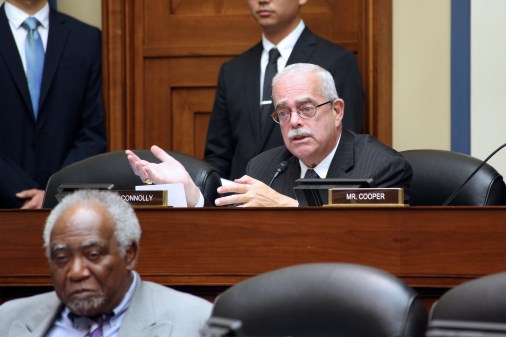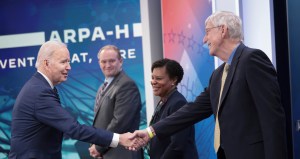Secretary Carter: DOD needs to think ‘outside the five-sided box’
Secretary of Defense Ashton Carter, right, opens the DARPA “Wait, What?” conference with DARPA director Arati Prabhakar Wednesday in St. Louis. (Greg Otto/FedScoop)
ST. LOUIS — Secretary of Defense Ashton Carter continued his outreach effort to the commercial technology sector Wednesday, telling a group of technologists, scientists and researchers their work can help shape a brighter future for not just the American military, but society as a whole.
“This audience represents one of America’s great strengths,” Carter said. “A fusion of our national security endeavor, the Defense Department and the wonderful innovative open technology community of companies and universities that have done so much for this country. You’re one of the reasons I feel so hopeful about America’s future.”
Carter kicked off the Defense Advanced Research Project Agency’s “Wait, What?” conference, a three-day event that highlights the agency’s projects and connects public and private sector minds to push the boundaries of technology for the Defense Department.
During his talk, he highlighted a number of people who have worked on recent innovation DARPA projects, pointing to programs that deal with traumatic brain injury, strength cybersecurity and sharpen weapon systems as examples of “thinking outside of the five-sided box,” — a reference to the Pentagon.
“[DARPA] did the right thing by not holding this conference in Washington,” Carter said. “Innovation is happening all over the country, on the East Coast to the West Coast and all over the heartland of America. DOD has to tap into all the streams of innovation and emerging technology, and it has to do much more quickly.”
Carter’s remarks come as he has spent time boosting the Defense Department’s technological outreach in the past few months. In April, Carter announced the formation of an experimental innovation unit based in Silicon Valley, a new military branch of the U.S. Digital Service, investments for tech startups and a revamped industry fellowship program for military officers. At the end of August, he announced a $171 million award granted to a consortium of over 160 Silicon Valley companies, universities and nonprofits that will pioneer research and development in the fields of flexible hybrid electronics and wearable devices.
Carter is hoping to mend fences between commercial technology companies and the Defense Department to keep the American military at the pinnacle of innovation. He said that relationship needs to endure in the face of adversaries, such as China, which are moving to close the gap.
“When I began my career, most technology of consequence originated in America and a lot of that was sponsored by the government,” he said. “Today, much more of our technology is commercial and the technology base is global. While our ties have endured through successes and strains, the challenges that we face today demand we strengthen our partnership, and it has to be in ways that benefit both of us.”
Carter also acknowledged that for this plan to be successful, lawmakers are going to have to be cooperative. He ripped Washington for failing to deal budget uncertainty, calling for a multiyear approach to DOD’s budget.
“Indiscriminate cuts from sequestration, not to mention the continuing resolution, are wasteful for taxpayers, dangerous to our strategy, unfair to our people and embarrassing in front of the world,” Carter said.
A combination of those cuts and enemies growing their technological capabilities served as a call to action to those in the room who can help DARPA make their moonshot programs a reality.
“We live in a changing world and our military’s excellence is not a birth right, it is not a guarantee,” Carter said. “We have to earn it again and again.”




